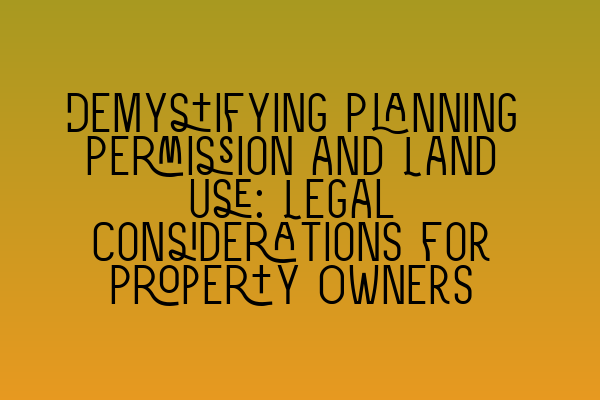Demystifying Planning Permission and Land Use: Legal Considerations for Property Owners
Welcome to SQE Property Law & Land Law. As expert solicitors in property law, we understand that navigating the intricate world of planning permission and land use can be a daunting task for property owners. This blog post aims to demystify the legal considerations surrounding planning permission and land use, providing you with a comprehensive guide to help you understand the key aspects and ensure compliance with the relevant regulations.
The Importance of Planning Permission
Planning permission is crucial when it comes to developing or altering a property. It is a formal consent from the local planning authority that determines whether a proposed development is suitable within the context of the local area. Without planning permission, you risk legal consequences, including being forced to undo the changes or facing hefty fines. Therefore, it is vital to gain a thorough understanding of planning permission requirements before initiating any development on your property.
To delve deeper into planning permission and its implications, consider reading our related article on Updates in UK Property Laws: Key Changes and Implications. This article provides valuable insights into recent amendments in property laws, which may significantly impact your planning permission application process.
Understanding the Planning Process
The planning process can be divided into several key stages, including:
- Pre-application stage: This stage involves researching and gathering information about the local planning policies and submitting a pre-application inquiry to the local planning authority. This step allows you to seek their initial feedback on your proposal.
- Formal application stage: After the pre-application stage, you can move forward with submitting a formal planning application. This application should include detailed plans, drawings, and any other supporting documents required by the local planning authority.
- Decision stage: The local planning authority will review your application, taking into account various factors such as the impact on neighboring properties, environmental concerns, and adherence to local policies and regulations. They will then make a decision to either grant or refuse planning permission.
- Appeals: If your planning application is refused, you have the option to appeal the decision to an independent Planning Inspectorate, where a different authority will review your case.
- Implementation stage: Once planning permission is granted, you can proceed with the development, ensuring compliance with the approved plans and any conditions imposed by the local planning authority.
For a more comprehensive guide on the legal challenges you may encounter during property transactions, we recommend reading our related article on Legal challenges in property transactions: A comprehensive guide.
The Role of Land Use Regulations
Land use regulations play a crucial role in determining what activities can be carried out on a property. These regulations are put in place to ensure that the land is used appropriately and without causing harm to other properties or the environment. Depending on the location and specific zoning regulations, certain activities may be permitted or restricted.
To navigate lease laws in the UK effectively, we encourage you to explore our related article on Navigating Lease Laws in the UK: Essential Guidelines for Tenants and Landlords. This article provides essential guidelines to help tenants and landlords understand their rights and obligations under lease agreements.
Common Land Use Classifications
Land use regulations often classify properties into specific categories, known as use classes. These classes determine the permissible uses of a property without requiring planning permission. Some common use classes in the UK include:
- Residential: Properties used primarily for residential purposes, such as houses and apartments.
- Commercial: Properties used for commercial activities, such as shops, offices, and restaurants.
- Industrial: Properties used for industrial or manufacturing purposes, such as factories and warehouses.
- Mixed-use: Properties that combine different uses, such as residential and commercial spaces within the same building.
- Agricultural: Properties utilized for agricultural purposes, such as farms and agricultural land.
To ensure you are aware of the potential legal pitfalls in property law, take a moment to read our related article on Dominate Property Law Questions: Avoiding Common Pitfalls.
Seeking Professional Advice
Given the intricacies of planning permission and land use, it is highly recommended to seek professional advice from experienced property law solicitors. Engaging a solicitor will ensure that your planning application is prepared accurately, adheres to all the necessary regulations, and increases the likelihood of a successful outcome.
For a comprehensive understanding of land law and effective exam preparation tips, we invite you to explore our related article on Land Law Revision Tips: Ace Your Exam Preparation.
Conclusion
Navigating planning permission and land use regulations can be complex, but with the right knowledge and guidance, you can ensure compliance and successfully develop or alter your property. Remember to seek professional advice, understand the planning process, and familiarize yourself with the relevant regulations to avoid any legal pitfalls. At SQE Property Law & Land Law, we are here to assist and provide expert advice tailored to your specific circumstances.
